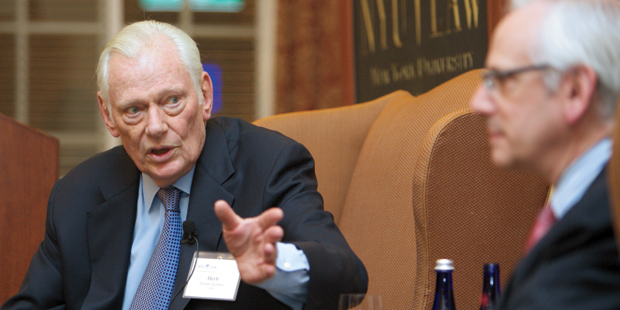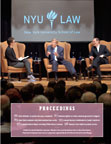A Bold Lawyer, a Visionary CEO
Legendary Southwest Airlines founder Herb Kelleher ’56 kicks off the NYU Leadership Series in Law and Business.
Printer Friendly VersionWhen Herbert Kelleher ’56, the charismatic founder of Southwest Airlines, sat down on February 28 for an intimate lunchtime conversation with students in the Snow Dining Room in Vanderbilt Hall, the first thing he did was ask the waiter if he had any whiskey. He was joking, of course. Or was he? Because while Kelleher’s claim to fame is founding and building what is arguably the only truly successful airline in the industry’s history, he’s also got an equally legendary taste for Wild Turkey. In the end, he settled for an iced tea.
Kelleher was in New York for the launch of the NYU Leadership Series in Law and Business that evening, where he received the Arthur T. Vanderbilt Medal, the Law School’s highest alumni award. The organizers of the series, the Mitchell Jacobson Leadership Program in Law and Business and the Pollack Center for Law & Business, had Kelleher in their sights for the debut interview from the very start. And why wouldn’t they? Kelleher’s incomparable achievements derive, above all, from his insights about leadership, which the evening’s audience would listen to with bated breath. But first, his student lunch companions would have a crack at him.
Kelleher’s accomplishments at Southwest—where he spent 20 years as president and CEO—are well documented. Starting with three airplanes in 1971, the airline was fielding 694 planes performing more than 3,400 flights per day by the end of 2012. The company has never had an unprofitable year, it has never furloughed an employee, and today it carries the most originating domestic passengers of any US airline. Shareholders have profited, too: From 1972 until 2002, Southwest delivered the highest return of any S&P 500 company, at 26 percent per year.
What is less known? That Kelleher spent 25 years as a corporate lawyer before founding Southwest, and that he views that experience as the key to his later success, not just something that came before it. If he hadn’t had a talent for legal tussle, he explained, Southwest would never have left the gate—Kelleher spent 10 years litigating with other carriers before the airline flew a single flight. In one six-year period, he endured 31 administrative and judicial proceedings.
One profound observation Kelleher offered was that the value of a law background resides purely in how a lawyer chooses to use it. Too many lawyers, he said, spend their time telling their clients (or themselves) why they can’t do something. “But that’s the comfortable answer,” he said. “The best lawyers are those that help you to do anything you want to do, by rearranging—within legal, ethical, and moral bounds—any obstacles to the outcome you seek. You can’t let people who are too scared or too negative control your actions.”
The chance to found Southwest, he added, came because of that openness to possibility, which led to his founding a San Antonio law firm to help clients start entrepreneurial
ventures. It was over a drink with one of those very clients that the original plan for Southwest was sketched out on a cocktail napkin. And while he clearly harbors no regrets, he did admit to missing a few opportunities, such as passing on the chance to own 10 percent of two clients’ ventures in exchange for waiving a $75 incorporation fee. One went on to invent roll-on deodorant, and the other, the strip that unwraps cigarette packs. (As a chain-smoker, Kelleher continues to pay for that second mistake daily.)
If there was a common thread between Kelleher’s lunchtime chat and his evening interview with Gerald Rosenfeld, co-director of the Leadership Program, it was that the airline really is about people. While some of Southwest’s success can be attributed to pure business decisions—such as using a point-to-point model versus traditional hub-and-spoke, and operating one model of airplane instead of several—both discussions returned to the idea that the most successful corporate leaders remember what made them successful in the first place. And in Southwest’s case, that was people.
Southwest, Kelleher explained, was founded with the understanding that the best businesses respect the worth of every person who works for them, not just as employees but also as human beings. Southwest succeeded by never losing sight of that premise. “There were those who predicted that our ‘family feeling’ would go away as we grew bigger,” he said, “but that didn’t happen—because taking care of people remained our primary focus.” In 1973, Southwest instituted the industry’s first profit-sharing program. “It was easy to do when we had no profits,” he said with a laugh. But it showed that the company was willing to put its money behind its motto.
In distilling his insights on leadership, Kelleher quoted the great poet Robert Frost: “Isn’t it a shame that when we get up in the morning our minds work furiously—until we come to work.” The secret at Southwest, he insisted, was to make sure that didn’t happen. And how did they do that? With another counterintuitive insight: that work and fun are not mutually exclusive. “Most people don’t want to look like they’re having fun at work for fear of getting fired,” said Kelleher. “But at Southwest, we’ll fire you if you aren’t smiling and having fun.” When the interview was over, Kelleher suggested that everybody join him at the bar for a drink—of Wild Turkey.
—

